Key takeaways:
- Emotional resilience in ministry involves processing pain and fostering compassion through shared experiences and support from peers.
- Practices like journaling, mindfulness, and regular peer check-ins are effective strategies for building resilience among hospital ministers.
- Developing supportive relationships with patients through active listening and consistent check-ins enhances emotional connection and healing.
- Sharing personal experiences and emotions within the ministry community strengthens bonds and promotes collective emotional wellbeing.
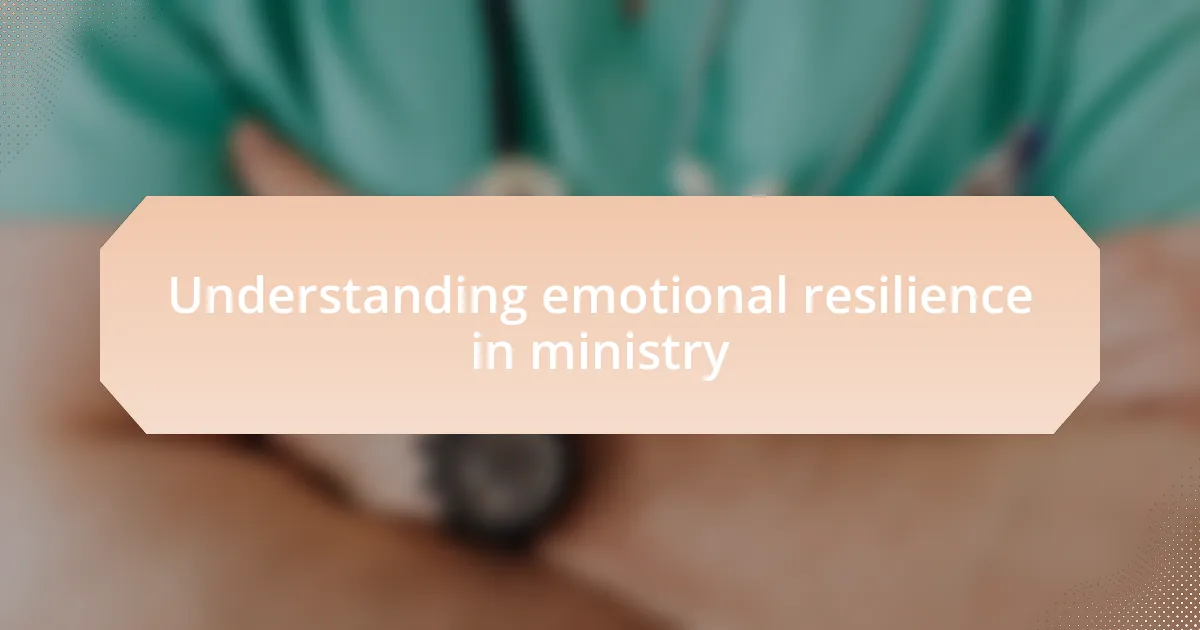
Understanding emotional resilience in ministry
Emotional resilience in ministry is vital, as it enables us to navigate the challenging landscape of spiritual care effectively. I remember a time when I struggled after visiting a patient who was facing dire circumstances. It made me question my own ability to provide comfort and support. This experience taught me that emotional resilience isn’t about being immune to pain; it’s about learning to process that pain and transforming it into compassion.
Consider how often we encounter loss in this field. When I lost a beloved congregation member, I was initially overwhelmed. Yet, I found solace in the support of my peers and learned that sharing our emotions can foster resilience, turning grief into strength. This makes me wonder: how can we create a community where vulnerability becomes a pathway to emotional growth rather than a sign of weakness?
Understanding emotional resilience involves recognizing our own emotional triggers and learning to respond to them constructively. I often reflect on moments of stress that could easily lead to burnout. By practicing self-care and seeking guidance, I’ve managed to regain my balance, which allows me to better serve those who need me. How do you cultivate resilience in your own life, and how might that practice influence your ministry?
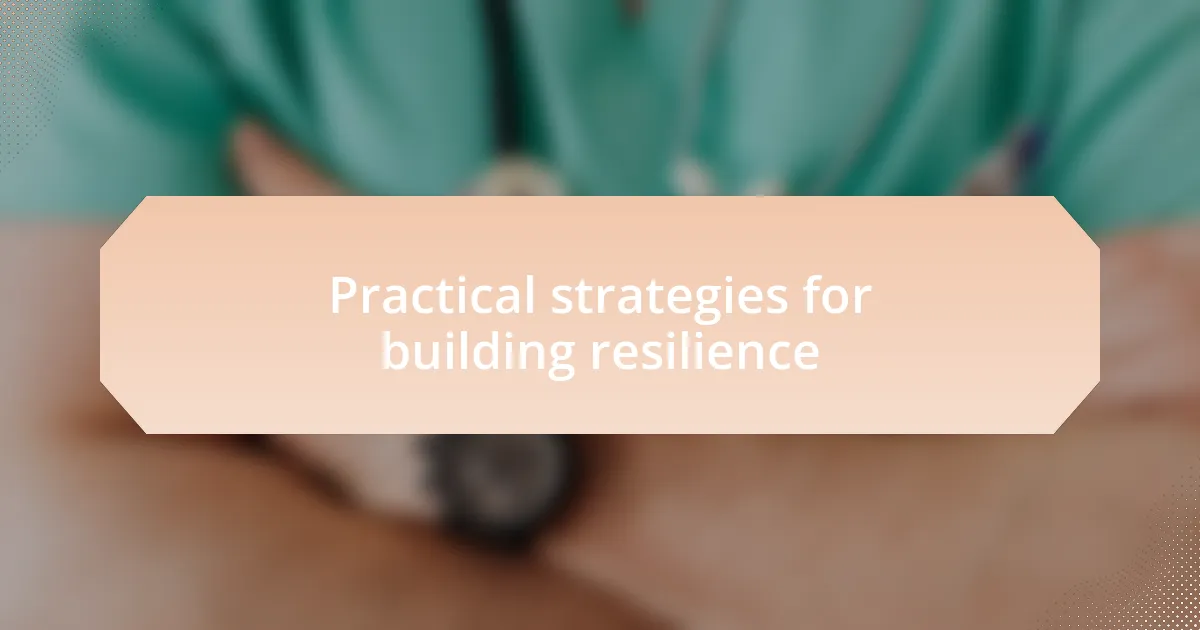
Practical strategies for building resilience
When it comes to building resilience, I find that developing a routine of reflection can be incredibly powerful. After difficult days, I often spend a few moments journaling about my experiences and emotions. This simple act helps me process my thoughts and fosters a deeper understanding of my feelings, ultimately making me more resilient. Have you ever tried reflecting in this way? It can be a transformative practice.
Another strategy that I cherish is seeking peer support through regular check-ins. I remember initiating a monthly coffee hour with fellow ministers, where we shared both our joys and challenges. This open exchange became a safe space for vulnerability, reminding me that I am not alone in my struggles and allowing me to draw strength from our shared experiences. How often do you engage with your peers, and how does that connection impact your emotional resilience?
Mindfulness practices also play a significant role in my journey toward resilience. I’ve embraced moments of stillness, whether through meditation or quiet walks, which serve as reminders to center myself amidst chaos. In those moments, I often ask myself, “What is within my control right now?” This question helps me focus on the present and reduces feelings of overwhelm. Have you considered incorporating mindfulness into your daily rhythm? It might just change your perspective.
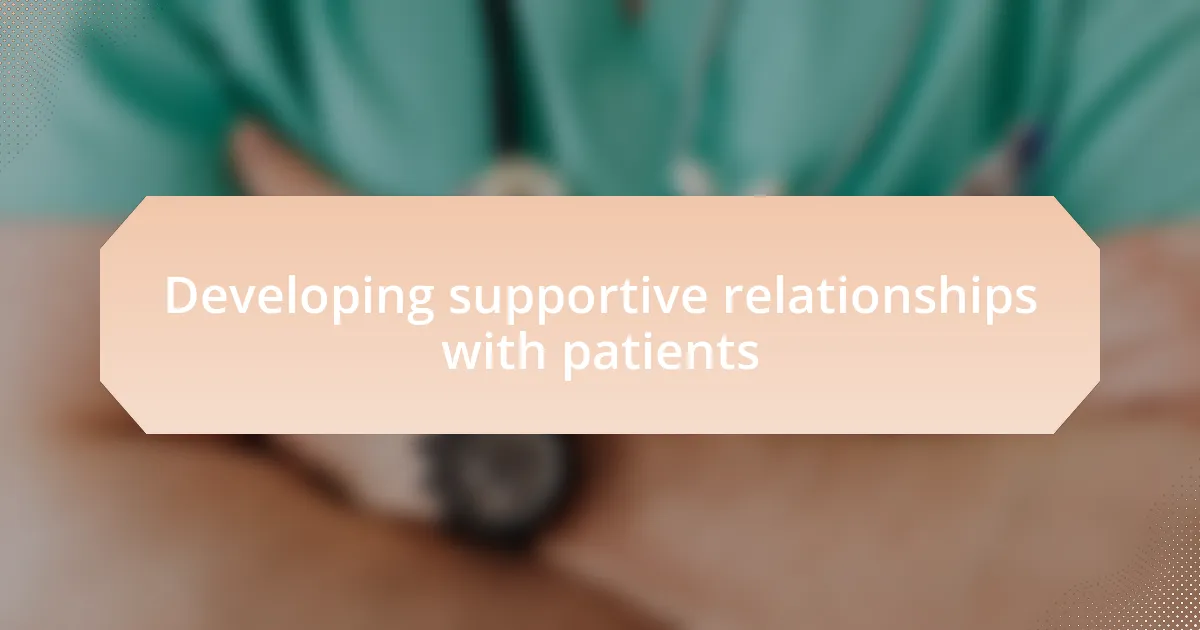
Developing supportive relationships with patients
Building supportive relationships with patients is essential in hospital ministry. I remember a time when I sat with a patient who seemed particularly withdrawn. It took just a gentle question about their favorite hobbies to open up a dialogue that revealed not only their fears but also their hopes. That simple interaction transformed our relationship, fostering trust and connection in an otherwise daunting environment. Have you ever noticed how a small gesture can shift the atmosphere in a room?
Active listening is another cornerstone of developing these relationships. I’ve found that when I genuinely listen—offering my full attention without judgment—patients often express feelings they might not have shared otherwise. This engagement creates a safe space where they feel valued and understood. It’s amazing to see how much healing can occur when someone simply feels heard. How often do we pause to really listen in our interactions?
Moreover, consistently checking in with patients reinforces their sense of support. There was a period when I made it a point to visit a particular patient daily, just to ask how their day was going. Our brief chats became moments they anticipated, providing a sense of normalcy amid the chaos of hospital life. It affirmed for me that investing time builds relationships that lead to healing. Have you considered what daily gestures might mean to your patients?
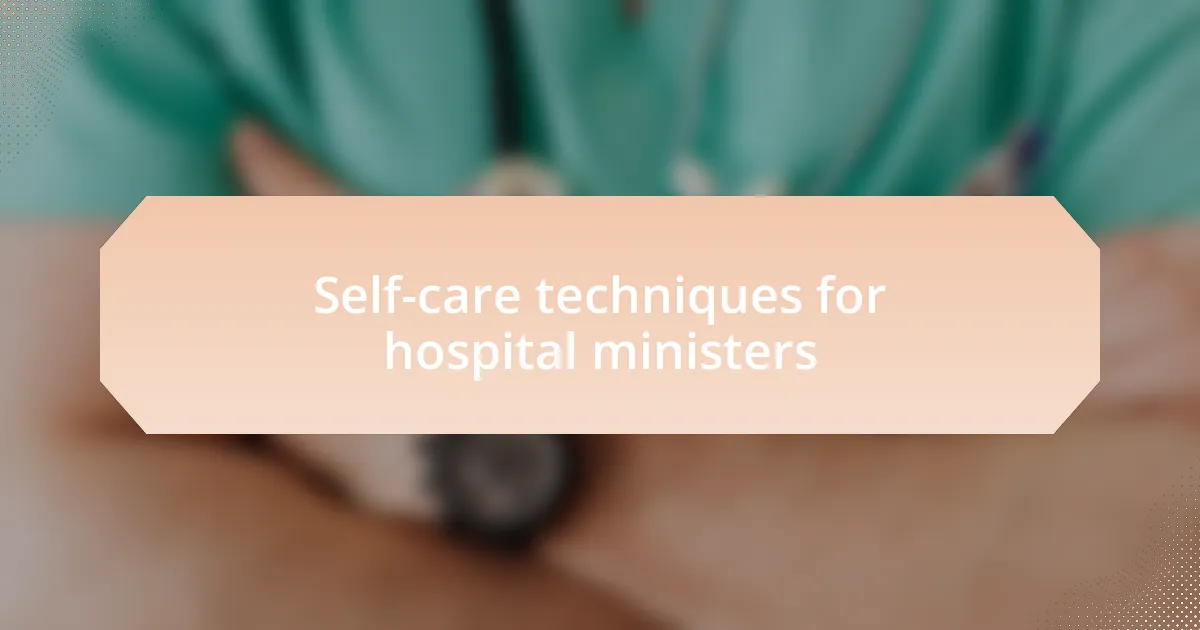
Self-care techniques for hospital ministers
Taking care of oneself is crucial for hospital ministers who often face emotional challenges. I recall a particularly exhausting week when the emotional weight felt heavier than usual. To recharge, I started practicing mindfulness for just ten minutes a day. This simple act of pausing, focusing on my breath, and letting go of tension helped me to clear my mind and feel more grounded. Have you tried a mindfulness approach in your routine?
In addition, creating a regular schedule for self-care activities can significantly enhance resilience. I make it a point to reserve time each week for activities that nourish my spirit, whether it’s walking in nature or reading a good book. I find that these moments of joy and relaxation allow me to return to my ministry with renewed energy and focus. Isn’t it important to prioritize what feeds our soul?
Moreover, establishing a support network among fellow hospital ministers can provide an essential outlet for sharing experiences and feelings. I remember a lunch I had with a colleague who understood the demands of our work. Sharing our challenges and wins created a sense of camaraderie that uplifted us both. Have you considered who in your life can be that trusted source of encouragement?
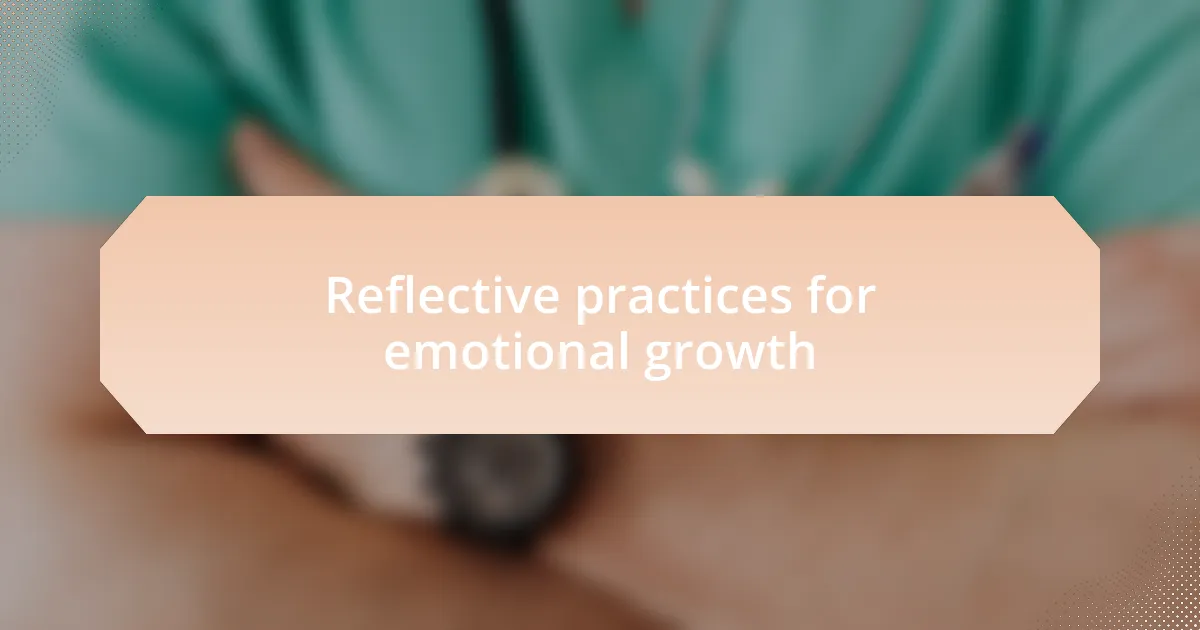
Reflective practices for emotional growth
Reflective practices can be an enlightening way to unlock emotional growth in our ministry. I’ve kept a journal for years, noting my daily experiences and feelings. This act of writing not only siphons off the stress of the day but also reveals patterns in my emotions, helping me better understand the triggers behind my responses. Have you ever tried journaling to explore your own feelings?
Another powerful practice I’ve adopted is the use of guided reflections after difficult interactions. After visiting patients, I often take a moment to think about what went well and what could have been different. Not only does this reflection enhance my future interactions, but it also fosters a sense of empowerment over my emotional wellbeing. Isn’t it amazing how a little self-reflection can lead to substantial growth?
Lastly, engaging in peer discussions about our experiences serves as a rich ground for emotional insight. I vividly recall a session where we discussed not simply our successes but also our vulnerabilities. This openness created a safe space to acknowledge our emotional challenges, reinforcing the idea that we are not alone in our struggles. How often do you take the time to discuss your feelings with a trusted colleague?
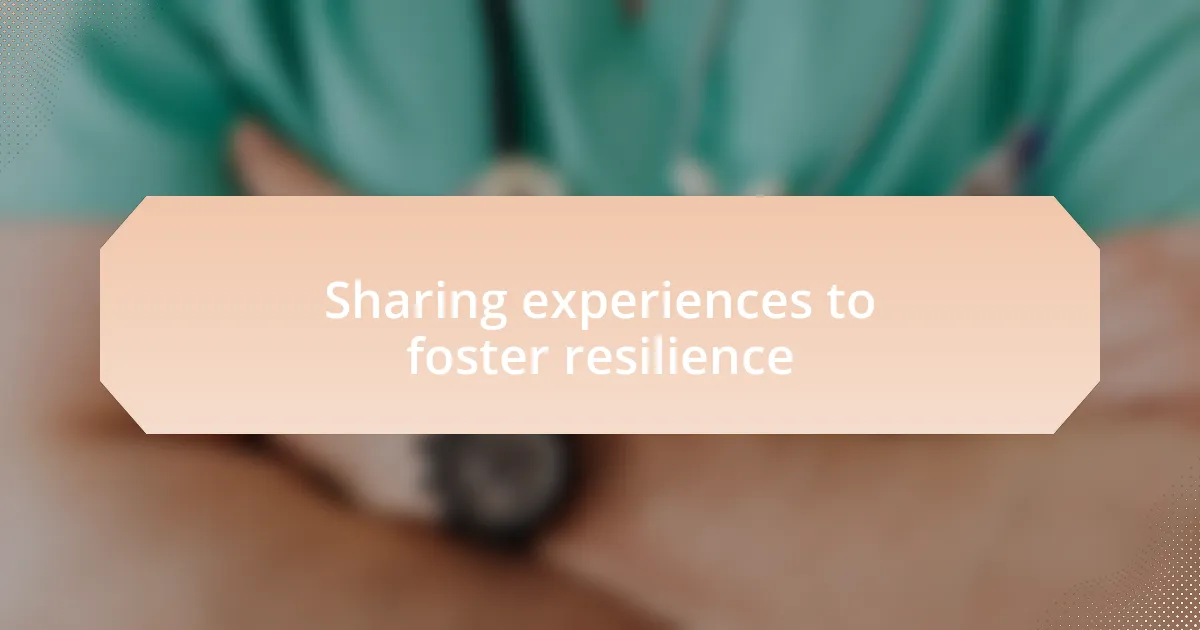
Sharing experiences to foster resilience
Sharing personal experiences can dramatically enhance our emotional resilience within hospital ministry. I remember a time when I felt overwhelmed after a particularly challenging day with a terminally ill patient. Sharing that experience with my colleagues opened a floodgate of emotions; their stories resonated with mine, reinforcing my belief that vulnerability fosters connection. Have you ever felt that power in sharing your own struggles?
In my ministry, I’ve found that storytelling, both personal and from others, has an unparalleled way of building resilience. I once listened as a fellow minister recounted a moment of profound grief alongside joy, and it struck a chord deep within me. It was a reminder that our emotional journeys are often intertwined, and those moments of shared experience can provide comfort during tough times. How do you perceive the strength found in narrating your own journey?
When we gather to share our experiences, we create a tapestry of support that nurtures our emotional wellbeing. Reflecting with my team on our collective highs and lows not only solidifies our bond but also highlights common challenges we face. I’ve learned that opening up about my emotional experiences doesn’t just benefit me; it empowers others to embrace their feelings too. Have you ever considered how sharing your story might inspire someone else in their journey?